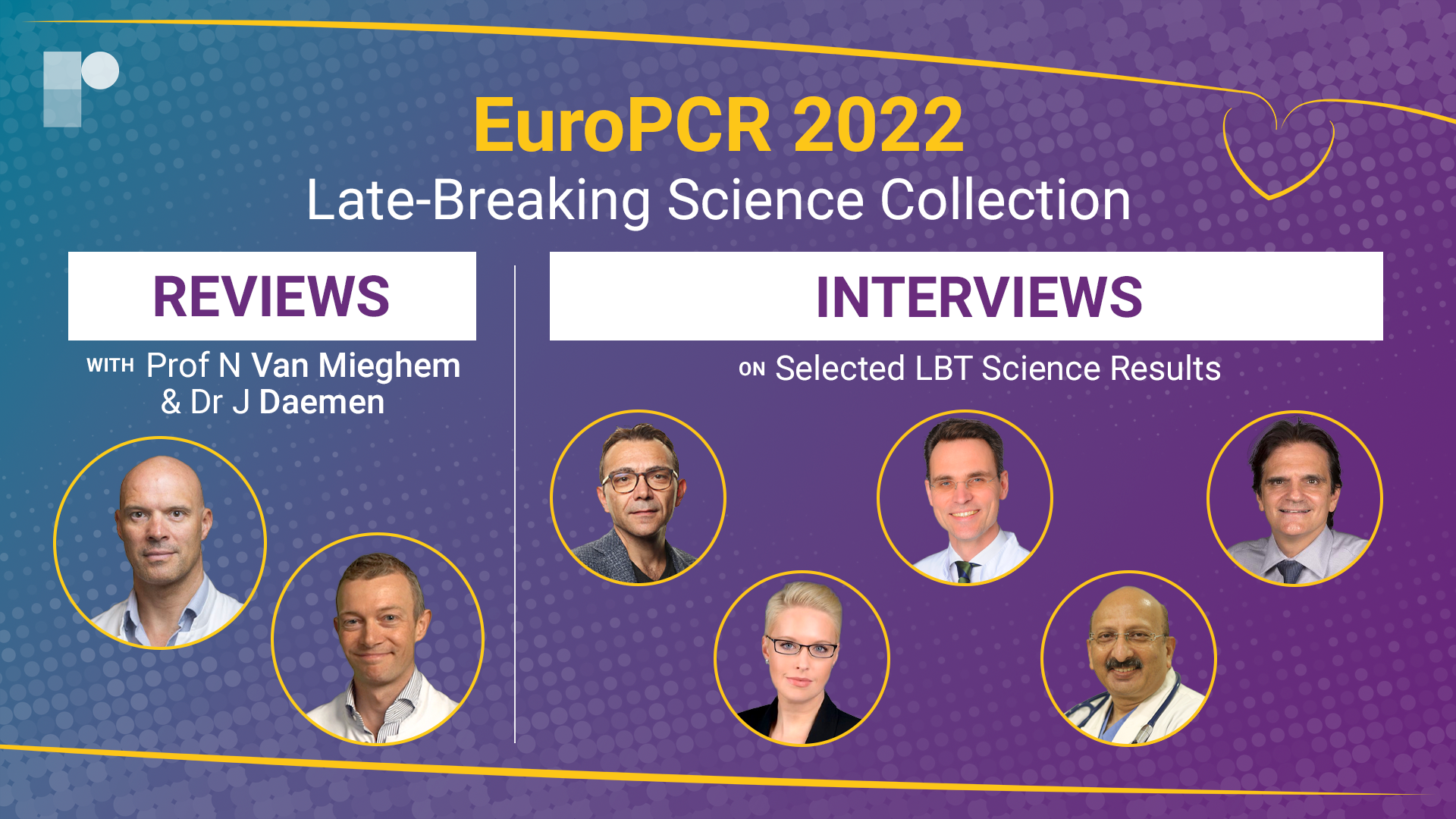EuroPCR 2022: Late-breaking Science Video Collection
Published: 13 May 2022
-
Views:
 2303
2303
-
Likes:
 7
7
-
Views:
 2303
2303
-
Likes:
 7
7
-
 Up Next
Up Next -
 4m 25sPart 2 | Session 15 EuroPCR 22: DEB & DES in the Treatment of Diffuse CAD
4m 25sPart 2 | Session 15 EuroPCR 22: DEB & DES in the Treatment of Diffuse CAD -
 3m 16sPart 2 | Session 16 EuroPCR 22: EASTBOURNE Registry indicates Satefy of Sirolimus-Coated Balloon
3m 16sPart 2 | Session 16 EuroPCR 22: EASTBOURNE Registry indicates Satefy of Sirolimus-Coated Balloon -
 4m 27sPart 2 | Session 17 EuroPCR 22: JenaValve TAVR System for the Treatment of Aortic Regurgitation
4m 27sPart 2 | Session 17 EuroPCR 22: JenaValve TAVR System for the Treatment of Aortic Regurgitation -
 7m 7sPart 2 | Session 18 EuroPCR 22: Transcatheter Tricuspid Valve Repair with PASCAL System
7m 7sPart 2 | Session 18 EuroPCR 22: Transcatheter Tricuspid Valve Repair with PASCAL System -
 6m 53s
6m 53s
-
 20m 24sPart 1 | Session 1 EuroPCR 22 Late-breaking Science Preview Joost Daemen, Nicolas M Van Mieghem
20m 24sPart 1 | Session 1 EuroPCR 22 Late-breaking Science Preview Joost Daemen, Nicolas M Van Mieghem
-
 27m 14sPart 1 | Session 2 EuroPCR 22 Late-breaking Science Wrap-Up Nicolas M Van Mieghem, Joost Daemen
27m 14sPart 1 | Session 2 EuroPCR 22 Late-breaking Science Wrap-Up Nicolas M Van Mieghem, Joost Daemen
-
 3m 28sPart 2 | Session 1 EuroPCR 22: AQVA Study Shows Superiority in QFR-Based Virtual PCI Arm Simone Biscaglia
3m 28sPart 2 | Session 1 EuroPCR 22: AQVA Study Shows Superiority in QFR-Based Virtual PCI Arm Simone Biscaglia
-
 5m 10sPart 2 | Session 2 EuroPCR 22: Patient-Level Pooled Analysis of Ultrasound RDN in radiance-HTN SOLO & Trio Ajay J Kirtane
5m 10sPart 2 | Session 2 EuroPCR 22: Patient-Level Pooled Analysis of Ultrasound RDN in radiance-HTN SOLO & Trio Ajay J Kirtane
-
 7m 50sPart 2 | Session 3 EuroPCR 22: Optimize PRO Interim Analysis Finds New Technique is "Best-in-Class" Kendra J Grubb
7m 50sPart 2 | Session 3 EuroPCR 22: Optimize PRO Interim Analysis Finds New Technique is "Best-in-Class" Kendra J Grubb
-
 5m 56sPart 2 | Session 4 EuroPCR 22: MASTER-DAPT Sub-Analysis Shows Consistent Results in Complex PCI Patients Marco Valgimigli
5m 56sPart 2 | Session 4 EuroPCR 22: MASTER-DAPT Sub-Analysis Shows Consistent Results in Complex PCI Patients Marco Valgimigli
-
 3m 34sPart 2 | Session 5 EuroPCR 22: CRUZ-HBR Indicates Use Of Supraflux™ Cruz Stent Is Favourable David Leistner
3m 34sPart 2 | Session 5 EuroPCR 22: CRUZ-HBR Indicates Use Of Supraflux™ Cruz Stent Is Favourable David Leistner
-
 4m 49sPart 2 | Session 6 EuroPCR 22: ASTRO-TAVI Shows Improved Neurological Outcomes With Neurointervention Amos Levi
4m 49sPart 2 | Session 6 EuroPCR 22: ASTRO-TAVI Shows Improved Neurological Outcomes With Neurointervention Amos Levi
-
 3m 53sPart 2 | Session 7 EuroPCR 22: Short-Term Clinical Outcomes of ACURATE neo2™ Andrea Buono
3m 53sPart 2 | Session 7 EuroPCR 22: Short-Term Clinical Outcomes of ACURATE neo2™ Andrea Buono
-
 4m 20sPart 2 | Session 8 EuroPCR 22: DECISION QFR Shows Increased Practicability and Shorter Procedure Time for Revasc. Taku Asano
4m 20sPart 2 | Session 8 EuroPCR 22: DECISION QFR Shows Increased Practicability and Shorter Procedure Time for Revasc. Taku Asano
-
 2m 18sPart 2 | Session 9 EuroPCR 22: SYNERGY™ Non-inferior to BioMatrix NeoFlex in OCT SORT-OUT VIII Michael Mæng
2m 18sPart 2 | Session 9 EuroPCR 22: SYNERGY™ Non-inferior to BioMatrix NeoFlex in OCT SORT-OUT VIII Michael Mæng
-
 5m 9sPart 2 | Session 10 EuroPCR 22: ROLEX Study Finds Promising Results in CAD Pts With the Resolute Onyx Giuseppe Tarantini
5m 9sPart 2 | Session 10 EuroPCR 22: ROLEX Study Finds Promising Results in CAD Pts With the Resolute Onyx Giuseppe Tarantini
-
 7m 18sPart 2 | Session 11 EuroPCR 22: Balloon Vs Self-Expanding Valves in Valve-in-Valve TAVI Josep Rodés-Cabau
7m 18sPart 2 | Session 11 EuroPCR 22: Balloon Vs Self-Expanding Valves in Valve-in-Valve TAVI Josep Rodés-Cabau
-
 5m 52sPart 2 | Session 12 EuroPCR 22: MitraClip in Atrial Functional Mitral Regurgitation Antonio Popolo Rubbio
5m 52sPart 2 | Session 12 EuroPCR 22: MitraClip in Atrial Functional Mitral Regurgitation Antonio Popolo Rubbio
-
 2m 15sPart 2 | Session 13 EuroPCR 22: SCB with Micro-Reservoir Technology in Coronary Lesions Praveen Chandra
2m 15sPart 2 | Session 13 EuroPCR 22: SCB with Micro-Reservoir Technology in Coronary Lesions Praveen Chandra
Overview
Our regular review series View from the Thoraxcenter hosted by Prof Nicolas Van Mieghem and Dr Joost Daemen (Thoraxcentre, Erasmus MC, Rotterdam, NL) provide a concise analysis of the late-breaking science trials and spotlight questions that could change treatment strategies in interventional cardiology.
Short, accessible Expert Interviews will be available with select faculty focusing on the results, applicability, and impact on future research.
More from this programme
Part 1
View from the Thoraxcenter
Part 2
Expert Interviews
Faculty Biographies

Nicolas M Van Mieghem
Medical Director
Prof Nicolas Maria Van Mieghem is an Interventional cardiologist at Thoraxcenter, Erasmus MC, Rotterdam, NL decided to pursue a career that would help others. “I enjoy the feeling of being able to help someone or do something important for them". His father was a general cardiologist and one of his biggest influences early in his career.
Prof Van Mieghem initially intended to train as a cardiac surgeon but decided to specialise in interventional cardiology instead, following advice from a mentor. This decision was cemented when he read the first-in-human case report of transcatheter aortic valve implantation (TAVI) in Circulation by Alain Cribier in 2002. Prof Van Mieghem believes that great cardiologist genuinely cares for their patients. He names Gary Roubin, Dr Manu Malbrain and Professor Patrick Serruys among his mentors.
His current research focuses on cerebral embolic protection during TAVI and the search for improved…
Transcript
Background of This Study
The FORWARD PRO is a prospective multicenter study evaluating the Evolut Pro transcatheter supra-annular functioning self expanding heart valve. In patients with severe symptomatic aortic stenosis both native aortic stenosis and degenerated aortic bioprosthesis. It's a prospective study with Echo Core Lab analysis of the Echo data at pre-discharge 1 year and 3 years and also an independent clinical event adjudication.
Patient Cohort and Study Design
So, the study design was according to the standards of good clinical studies that we have these days. So an independent core lab was evaluating the Echo cardiograms at pre-discharge 30 days 1 year and 3 years. There was also independent clinical event adjudication the trial enrolled over 600 patients and the follow up was complete for 87% of the patients at 3 years, which is quite okay. At the mean age of the patients was above 80 years old. So, 81 years old. The SDS score was quite high 4.7 and the majority of the patients included were female, were women. And the trial specifically was aiming not for the low risk patients, but for patients at a higher operating risk.
Devices Studied
So, the FORWARD PRO was the was the main trial evaluating the supra-annular functioning Evolut Pro transcatheter heart valve. And the, the major innovation in that device iteration was the addition of a pericardial wrap to mitigate paravalve release. At the same time, the device is repositionable and retrievable.
Key Outcomes at Three Years
The key outcomes are mortality was 25% at the 3 years, and you could see an annual mortality risk of between 8% and 9%. Which is totally in line with the risk profile of these patients. Again, these were not low risk patients. These patients had a significant comorbidities and also a 3rd of the patients were considered to be frail. So expectedly, you would see some kind of mortality. At the same time, stroke rate was relatively low. The disabling stroke rate was 6% that 3 years which also is completely in line with our expectations in this patient population with an annual stroke rate after 1 year of 1%, as expected. Pacemaker rates were 22% And we have to bear in mind that patients were enrolled in this study in the years 2018 & 2019. So we were not applying these new implantation techniques to lower pacemaker rates.
Take-Home Messages
There are two important findings I think; first of all there are no durability issues at least out of 3 years. So the valve performance was excellent with superior hemodynamics that we know with an Evolut platform PVL was low. The majority of the patients had no or only a trace para-valval leak. And the interesting finding is that 189 patients had Echos at pre-discharge at 1 year and at 3 years. In those patients we could tell that the rate of more of mild or more PVL was going down over time. And that was quite of interest and it's for the first time that that has been demonstrated with a TAVI platform. And one of the hypotheses could be that the Nitinol which is the framework of the Evolut Pro, that that keeps on expanding and becomes more circular as time progresses. So that is quite interesting. And another important observation is that the risk or the rates of thrombosis, valve thrombosis, endocarditis and need for a reintervention were super low, less than 1%.
Next Steps
So the next steps are basically what the community is already doing. We're moving to lower risk patients patients that are younger, have lower life expectancy. So lifetime management becomes very important. Obviously, in those patients you want to have a very reliable technology at hand Technology that probably should be repositionable and retrievable in order to optimise your implant and also should include a sealing fabric to mitigate paravalvular leaks. Obviously there are, there's also the conduction issue, but with new implantation techniques, that is the Optimize Pro study that also was presented here at EuroPCR. We are able to reduce the need for pacemakers to single digit numbers.





